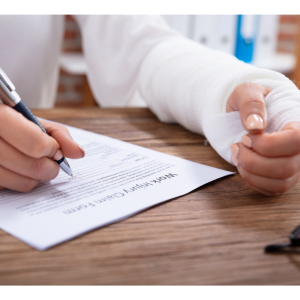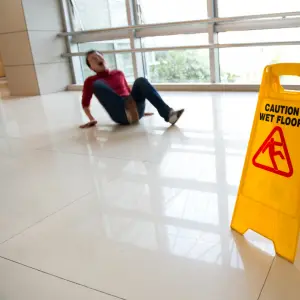What is Pain and Suffering?
Pain and Suffering is a legal term that describes the physical, emotional, and mental injuries a personal injury victim sustained following an accident.
According to Black’s Law Dictionary, pain and suffering is defined as “physical discomfort, emotional trauma, or mental anguish that a plaintiff experiences as a result of a defendant’s actions.” As such, it often refers to the non-economic damages that a plaintiff may claim to compensate for the physical pain, emotional anguish, and diminished quality of life caused by the defendant’s actions or negligence.
Pain and suffering can include physical pain or emotional distress. For example: Amy is in a car accident because the other driver drove recklessly. As a result of the accident Amy might suffer from back problems and have a panic attack every time she tries to drive a car. Therefore, not only could Amy sue the other driver for the damage to her car, but also for the pain and suffering it has caused her physical and emotional health. Pain and suffering is aimed at providing compensation to injuried parties, and to have those at fault recognize the harm they caused and deter them from repeating their actions. Understanding pain and suffering is essential in personal injury litigation to ensure that plaintiffs receive fair and just compensation for the full scope of their injuries and losses.
More information about Pain and Suffering
What Information Should I Obtain From the Other Driver After a Car Accident?

We all know the basics of car accident etiquette. Remain calm, check yourself and your passengers for injuries. And of course, swap contact information with the other driver(s) involved. But what additional information should you obtain from the other driver after a car accident? Further, how do you obtain that information during a stressful situation?
What Basic Information Is Needed From The Other Driver?
There is no doubt that car accidents are stressful and still, incredibly common. According to Driver Knowledge, more than 90 people die in car accidents every day.
Be it from distracted driving, driving under the influence, speeding, road conditions, etc., when a car collision occurs, drivers need to be prepared to take action immediately.
In general, insurance companies will request the following information from the involved drivers at the accident scene:
- Driver’s name and contact information
- Name and contact information of the driver’s insurance company
- Insurance policy number and expiration date
- Vehicle details (make, […]
More information about Pain and Suffering
What Is the Difference Between a First-Party and Third-Party Claim?
 When you are involved in an accident, you may wonder where you’ll get the compensation needed to recover. Is it your insurance who foots the bill or the other parties who may be at fault? Further, can you still file a lawsuit if you have insurance? First-party and third-party insurance claims are similar in what you can recover in many ways–the key difference is in who is held liable.
When you are involved in an accident, you may wonder where you’ll get the compensation needed to recover. Is it your insurance who foots the bill or the other parties who may be at fault? Further, can you still file a lawsuit if you have insurance? First-party and third-party insurance claims are similar in what you can recover in many ways–the key difference is in who is held liable.
Here is what you need to know about first-party and third-party insurance claims.
What Is a First-Party Claim?
In essence, a first-party insurance claim is one where you as the victim of an accident or injury make a claim against your insurance. This means you’ve paid and have an insurance policy for such events and will recover compensation from that policy.
If you have insurance, a first-party claim allows you to notify your insurance company of the accident and from there, […]
Read MoreMore information about Pain and Suffering
What is the Deadliest Day to Drive?
Most Dangerous Days to Be On the Road
Car accidents happen every day all across America. The National Highway Traffic Safety Administration estimates that for the first 9 months of 2021, 31,720 people died in motor vehicle traffic crashes in the U.S. That is up 12% from the same time in 2020 and the highest since 2006.
Certain seasons, days and times of days prove more dangerous than others. Generally any time that sees more drivers on the roads leads to more accidents. This means summertime and holiday seasons are the deadliest days to drive due to high traffic conditions paired with distracted and drunk driving.
If you or a loved one has been injured in a car accident, make sure you have an experienced car accident lawyer by your side. The car accident attorneys at Munley Law Personal Injury Attorneys have been representing accident victims for more than 60 years. […]
Read MoreMore information about Pain and Suffering
How Much Time Do I Have To Sue After A Slip And Fall Accident?
Statute of Limitations for Slip and Fall Accidents
 The statute of limitations varies by state. For example, in Pennsylvania, slip and fall accidents fall under the broad category of “personal injury,” giving you two years from the date of when your injuries first occurred to file suit. When you suffer injuries from slip and falls, trip and falls, and other similar accidents, 42 Pa.C.S. § 5524(2) states that you have two years from the date of your accident to initiate a lawsuit and seek compensation.
The statute of limitations varies by state. For example, in Pennsylvania, slip and fall accidents fall under the broad category of “personal injury,” giving you two years from the date of when your injuries first occurred to file suit. When you suffer injuries from slip and falls, trip and falls, and other similar accidents, 42 Pa.C.S. § 5524(2) states that you have two years from the date of your accident to initiate a lawsuit and seek compensation.
Slip and fall accidents caused by negligence or the failure of property owners to maintain safe and hazard-free premises can cause severe injury and even death. According to the New York Times, the winter months are worse for people of all ages, as ice, snow, and slippery trip hazards make slip and fall accidents more prevalent. Wherever you are in America, […]
Read MoreMore information about Pain and Suffering
Does Filing A Workers’ Compensation Claim Affect Employment?
 If you’ve been injured at work and are considering filing a workers’ compensation claim, you’re probably worried about how it might affect your ability to find employment in the future. This fear is completely understandable, but the short answer is no – filing a workers’ compensation claim should not hurt your future job prospects in Pennsylvania, and the law is specifically designed to protect you from this type of discrimination.
If you’ve been injured at work and are considering filing a workers’ compensation claim, you’re probably worried about how it might affect your ability to find employment in the future. This fear is completely understandable, but the short answer is no – filing a workers’ compensation claim should not hurt your future job prospects in Pennsylvania, and the law is specifically designed to protect you from this type of discrimination.
At Munley Law, we’ve helped hundreds of Pennsylvania workers protect their employment rights after workplace injuries. Our experience shows that understanding your legal protections and knowing how to navigate the job search process can make all the difference in maintaining your career trajectory after a work-related injury.
Your Complete Legal Protection Guide: Pennsylvania Employment Rights After Workers’ Compensation
Pennsylvania workers enjoy some of the strongest employment protections in the nation when it comes to workers’ […]
Read More








